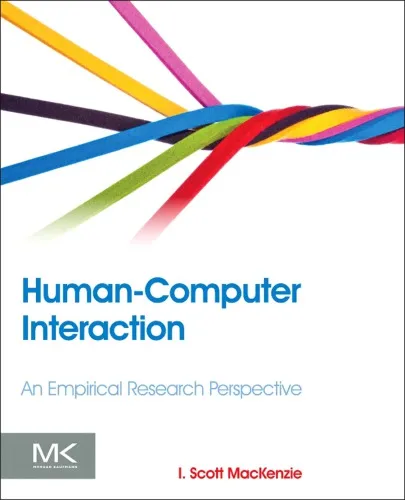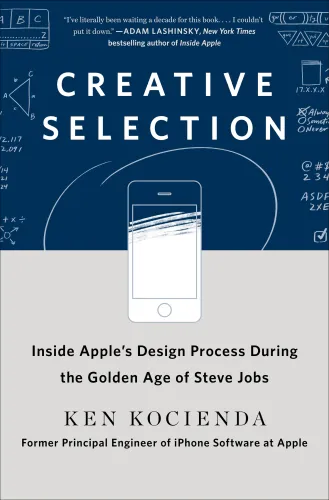Human-Computer Interaction: An Empirical Research Perspective
4.5
بر اساس نظر کاربران

شما میتونید سوالاتتون در باره کتاب رو از هوش مصنوعیش بعد از ورود بپرسید
هر دانلود یا پرسش از هوش مصنوعی 2 امتیاز لازم دارد، برای بدست آوردن امتیاز رایگان، به صفحه ی راهنمای امتیازات سر بزنید و یک سری کار ارزشمند انجام بدینکتاب های مرتبط:
معرفی کتاب 'Human-Computer Interaction: An Empirical Research Perspective'
کتاب 'Human-Computer Interaction: An Empirical Research Perspective' نوشتهٔ من، I. Scott MacKenzie، به بررسی جامع و عمیق تعامل انسان و کامپیوتر با تمرکز بر تحقیقات تجربی میپردازد. این کتاب به صورت خاص برای محققان، دانشجویان و علاقهمندان به حوزهٔ HCI طراحی شده که مایلند بینشهای علمی و عملی بیشتری دربارهٔ تعامل انسان و ماشین به دست آورند.
خلاصهای از کتاب
این کتاب به یادگیری مبانی و روشهای تحقیقاتی HCI با رویکرد تجربی تمرکز دارد. از جمله موضوعات مهمی که در این کتاب پوشش داده شده میتوان به طراحی رابطهای کاربری، الگوهای استفاده، و روشهای ارزیابی تجربی اشاره کرد. بحثهای گستردهای درباره چگونگی اندازهگیری عملکرد و بهرهوری، کاوش در طراحیهای مختلف، و تأکید بر اهمیت بازخورد کاربر آورده شده است. این کتاب ابزارهای لازم برای فهم پیچیدگیهای طراحی و ارزیابی سیستمهای تعاملی را فراهم میکند.
نکات کلیدی
- تمرکز بر روشهای تجربی در تحلیل و طراحی HCI.
- ارائهٔ دیدگاهی جامع و مستند بر اساس تحقیقات علمی.
- بررسی ابزارها و روشهای اندازهگیری عملکرد کاربری.
- تأکید بر طراحیهای کاربر محور و بازخورد مستمر.
نقل قولهای معروف از کتاب
تجربه و تجربهپذیری طراحی کلید اصلی درک رفتارهای کاربران در محیطهای دیجیتالی است.
هر طراحی موفقیتآمیز وابسته به توانایی آن در پاسخگویی به نیازهای کاربر نهایی است.
چرا این کتاب مهم است
تعامل انسان و کامپیوتر بیش از پیش در زندگی روزمره ما تأثیرگذاره شدهاست. این کتاب از آن جهت اهمیت دارد که نه تنها به توضیح مبانی و اصول HCI میپردازد، بلکه ابزارها و روشهایی را فراهم میکند که برای بهبود تعاملات انسان و ماشین حیاتی هستند. با تمرکز بر رویکرد تجربی، این کتاب به خوانندگان کمک میکند تا به طور مؤثرتری به طراحی و ارزیابی سیستمهای تعاملی بپردازند. این کتاب همچنین به تربیت نسل جدیدی از محققان و طراحان کمک خواهد کرد که میتواند تفاوتهای گستردهای در فهم تعاملات ماشینی و کاربرد آن در فناوریهای آینده ایجاد کند.
Introduction to 'Human-Computer Interaction: An Empirical Research Perspective'
The book "Human-Computer Interaction: An Empirical Research Perspective" offers a comprehensive exploration into the dynamic and fascinating world of HCI. Authored by I. Scott MacKenzie, this book delves into the empirical research methodologies and the foundational principles that drive innovative interactions between humans and computers. Designed both for students and professionals in the field, MacKenzie's work provides a robust framework for understanding and applying empirical research methods to enhance user experiences with technology.
Detailed Summary of the Book
The book systematically introduces the principles and practices fundamental to the understanding of Human-Computer Interaction (HCI). It begins by discussing the importance of HCI and the evolution of research within the field, setting the stage for a deeper exploration of empirical research methods. MacKenzie emphasizes on the scientific approach towards understanding human interaction with computers, providing detailed insights into user behavior, cognitive processes, and usability testing.
Chapters are structured to guide readers through various methodologies, including qualitative and quantitative research techniques, statistical analysis, user-centered design, and evaluation methods. Each section is intertwined with real-world examples and case studies, offering practical applications of theoretical concepts. The book also addresses the significance of designing for diverse user needs, considering cultural, cognitive, and emotional factors that influence interaction with technology.
Key Takeaways
- Comprehensive understanding of empirical research methods in HCI.
- Insight into the cognitive, social, and ergonomic aspects of user interaction.
- Practical guidance on conducting usability studies and interpreting data.
- Strategies for designing user-centered interfaces that enhance user satisfaction and performance.
- Applications of HCI principles in emerging technologies like virtual reality and artificial intelligence.
Famous Quotes from the Book
"To design an interface means to manage the complexity not by reducing it, but by mastering it."
"Empirical research in HCI is not just about using scientific methods to understand users, but also about integrating these insights into the design process."
"A user-centered approach is not an option but a necessity for creating impactful and meaningful technology experiences."
Why This Book Matters
The significance of "Human-Computer Interaction: An Empirical Research Perspective" lies in its meticulous approach to coupling scientific inquiry with practical application. In an era where technology is pervasive and ever-evolving, understanding the nuances of how users interact with devices and systems is paramount. This book serves as a crucial resource for anyone involved in the design and development of user interfaces and technology solutions.
By bridging the gap between theory and practice, MacKenzie equips readers with the tools needed to conduct impactful research and translate findings into actionable design enhancements. This, in turn, drives the creation of more intuitive, efficient, and user-friendly technological products. For educators, students, and practitioners alike, the book stands as an indispensable text that informs and inspires innovation in HCI.
دانلود رایگان مستقیم
شما میتونید سوالاتتون در باره کتاب رو از هوش مصنوعیش بعد از ورود بپرسید
دسترسی به کتابها از طریق پلتفرمهای قانونی و کتابخانههای عمومی نه تنها از حقوق نویسندگان و ناشران حمایت میکند، بلکه به پایداری فرهنگ کتابخوانی نیز کمک میرساند. پیش از دانلود، لحظهای به بررسی این گزینهها فکر کنید.
این کتاب رو در پلتفرم های دیگه ببینید
WorldCat به شما کمک میکنه تا کتاب ها رو در کتابخانه های سراسر دنیا پیدا کنید
امتیازها، نظرات تخصصی و صحبت ها درباره کتاب را در Goodreads ببینید
کتابهای کمیاب یا دست دوم را در AbeBooks پیدا کنید و بخرید
1541
بازدید4.5
امتیاز0
نظر98%
رضایتنظرات:
4.5
بر اساس 0 نظر کاربران
Questions & Answers
Ask questions about this book or help others by answering
No questions yet. Be the first to ask!





















